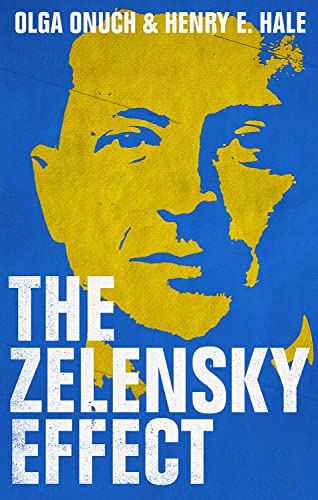The Zelensky Effect

The “Zelensky effect,” according to this accessible and very relevant book, is his ability to mobilise Ukrainian “civic national identity” or “44 million Zelenskys,” as the authors describe it, in the face of Russia’s 2022 invasion. The work is both a story of Ukraine’s modern history and the political life of Zelensky himself, although it favors brevity over in-depth analysis. It draws creatively on polling figures, word clouds, but most interestingly the fictional President Zelensky himself played in “Servant of the People” TV series to tell the story of his rise and the country’s clash with Russia.
It paints the president in a hugely positive light as the ultimate nation builder in a country too quickly divided by those who see it as either pro-Western or pro-Russian. The book charts the modern history of Ukraine and Zelensky as a product of the “independence generation” brought up after the 1991 referendum that saw 92% of the country vote in favor of independence from the USSR. It charts from independence to the 2004 “Orange Revolution,” to the 2013 “Euromaidan” protests and eventually his landslide 2019 election win, Covid, and then of course the fateful moment in February 2022 when Russian tanks crossed into the country.
While attention and media coverage of Ukraine has risen vastly since last year, the authors remind readers that 37% of Ukrainians were considering migration prior to the invasion, a number that has since plummeted to 5% not accounting for those forced to flee. Zelensky’s decision to not flee when the capital was under attack was a central moment and one explained by his vision of uniting a stronger Ukraine in the years before. Tackling corruption, poverty and taking on the vested interests through his “de-oligarchization” policy was all evidence of the kind of politician he was. Frustratingly there is not detail as to his personal life, beyond the fact that he was an only child from the industrial southeast of the country who studied law.
While in the West his election was seen particularity in that a comedian was being voted head of state, the book explains that he was in fact a media mogul and successful businessman first and foremost, and that his media experience would help him with the communication skills that were so vital for his wartime role.
His awareness of his own strengths and weaknesses meant that he didn’t micromanage the Ukrainian military whose agility was a huge source of strength against a more powerful Russian opponent. The book of course captures Zelensky at a critical moment with the war neither won nor lost, and his story yet to end. Nevertheless, it is an enjoyable introduction for those unfamiliar with the man and the country.